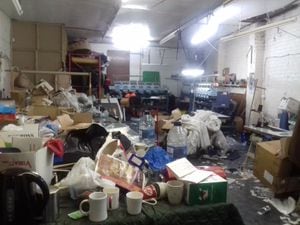Businessman jailed for running fake clothing factory producing thousands of rip-off items
A Birmingham man has been jailed for four years after he admitted manufacturing and selling fake designer clothes.

Inderjit Sangu, 67, formerly of Sandwell Road, owned a clothing manufacturing business in Park Road, in Hockley, that was producing tens of thousands of counterfeit goods - causing an estimated loss to the clothing industry of £5 million - and distributing them to market stall and online sellers across the UK.
The court heard that on August 27, 2019 – as part of Operation Beorma – officers from the National Trading Standards Regional Investigation Team (RIT), Birmingham Trading Standards and West Midlands Police executed search warrants at Sangu's factory and home address.
Operation Beorma is an ongoing investigation led by the National Trading Standards RIT and Birmingham Trading Standards into organised crime groups involved in the importation, manufacturing and distribution of counterfeit goods.
Members of the Anti-Counterfeiting Group – made up of brand representatives – examined the stock at the Hockley factory and confirmed they were fake.
Trading Standards officers seized the fake designer clothing with a street value of approximately £500,000 – as well as approximately 40,000 counterfeit branded clothing labels. The fake designer labels included brand names such as The North Face, Polo Ralph Lauren, Hugo Boss, Nike, Moncler, Versace, Givenchy, Stone Island, Super Dry, Prada, Lacoste and Canada Goose.
Sangu pleaded guilty to 26 trade mark offences. The court was told that three large industrial embroidery and sewing looms were found at the unit and there was clear evidence indicating counterfeit clothing being manufactured at the premises on a large scale.
In sentencing Sangu, Mr Recorder Bradreth QC siting at Birmingham Crown Court, told the defendant that there had been "serious planning and pre-meditation" in the counterfeiting operation, as well as a "pattern of sophistication for which you are the leader". He concluded by saying that "only a custodial sentence could be justified".
Councillor Phil Davies, chairman of Birmingham City Council’s licensing and public protection committee, said: “This was one of the largest operations ever to be disrupted in the city. People may think counterfeiting is a victimless crime, but it's not.
"Counterfeiting is often linked to organised crime, drugs, modern slavery and child labour. They are ripping off the consumers, legitimate businesses and Inland Revenue. Birmingham Trading Standards will do everything they can to disrupt these organised crime groups who are involved in this illicit business."
Lord Toby Harris, chairman of the National Trading Standards Board, said: "Trading standards officers and other partners are tackling this criminal activity. Consumers risk being misled and parting with hard earned money to pay for fake products.
"We will continue to work together to disrupt the organised crime groups and clamp down on criminals who sell counterfeit goods to unsuspecting members of the public. We urge people to be vigilant and report any examples of sales of counterfeit goods by calling the Citizens Advice Consumer Helpline on 0808 223 1133.”
Graham Mogg, intelligence co-ordinator for the Anti-Counterfeiting Group, added: "The potential loss to industry was estimated at being more than £5 million.
"Each of the 40,000 labels seized would have been used to create a counterfeit item. Whilst some may have been used to create a T-shirt that sold for between £40 and £50, others such as the counterfeit Canada Goose and Moncler labels would have been used to counterfeit clothing worth more than £1,000 per item."
A Proceeds of Crime Act case will follow later in the year.





